- Home
- Grace Thompson
Goodbye to Dreams Page 6
Goodbye to Dreams Read online
Page 6
‘Right too,’ Uncle Ben’s booming voice agreed. ‘Can’t expect two young women to handle a shop like this on their own.’ His voice was deep and slow and with an air of importance that hinted at his solo work with the choir.
‘On the contrary,’ Mr Grainger replied. He swallowed nervously glancing around at the faces staring at him and felt a strong urge to throw the papers in the air and run for it. ‘On the contrary,’ he said, looking at Dorothy in terror. ‘The two sisters are to be in sole possession of the shop, house and the business.’
‘Sole possession? You mean a temporary responsibility, surely?’ She yanked her fat son to his feet. ‘I’m the widow of Victor, the eldest son. My son should be the one to inherit. Owen Owen he’s called, named for his grandfather. The shop is his by right!’
Voices murmured then rose as opinions varied. The room was soon humming with attacks, counter attacks and general disapproval. Only Cecily and Ada sat in silence, not even defending themselves against the abuse that came their way. It was Waldo who succeeded in silencing the irate family. He stood up and thumped a few chords on the piano.
‘Ladies and gentlemen, let’s have some hush, shall we?’ Uncle Ben helped by using the same words, only singing them in a voice so powerful it all but deafened those sitting close to him.
‘It was Owen Owen’s wish,’ the solicitor continued after rubbing his ear, ‘his wish, that his daughters, Cecily and Ada, should jointly own all he had to leave with the exception of a few personal items which I will now list.’ He read to a silent room a list of the man’s treasures: a stamp collection, a couple of watches, walking sticks, his bicycle. There was something for every member of the family but the gifts did not please.
In the discussion that followed, Cecily saw Dorothy’s shy daughter slip out and run down the stairs. Dorothy was too involved in protests on behalf of her son to notice her daughter’s disappearance.
Dorothy insisted, and threatened, and warned that she would go to the law if necessary to regain her son’s inheritance.
‘Mrs Owen, I represent the law,’ Mr Grainger said mildly. ‘I can tell you there is nothing wrong with the will, and no ambiguity about Mr Owen’s intentions. We discussed it just a few weeks ago to make sure there would be no such doubts.’ He sighed and added, ‘As if the poor man had a premonition of his demise.’
‘God works in mysterious ways,’ boomed Uncle Ben.
‘There is something wrong with it!’ Dorothy insisted. ‘My son is the son of the eldest son and named for his grandfather. It smacks of coercion and undue influence to me. Someone put pressure on him.’
Rhonwen looked at the sisters, smiled sympathetically and gave a shrug as if telling them to shake off the abuse.
‘Come on, Ada,’ Cecily said. ‘We’ll go down and make another pot of tea while the relatives hear the rest of the will.’
‘There’s more?’
The sisters linked arms and left the babble of voices behind them and went downstairs to the back kitchen. Once inside the cold room Ada closed the door and they both danced around, laughing with joy.
‘It’s over! The news is out! Once Mr Grainger has told them firmly that the shop is not their business, we’ll be free to do with it what we want.’
The kettle had been simmering on a low jet and they quickly made tea, washing the cups while the tea steeped. Then, completely serious-faced, they returned to where the family now sat in subdued silence. Mr Grainger had finished speaking and the silence his words had invoked remained almost intact when the tea was drunk. Then people began to rise and Ada went downstairs to hand out coats and assist their guests to depart.
Waldo and Melanie Watkins stayed, obviously wanting to discuss something with the sisters. Dorothy also delayed leaving.
‘Where’s Annette?’ she demanded. ‘I don’t know what’s the matter with the girl but she’s never where I want her to be. Never doing what I want her to do.’
‘She’s in the stables with Willie, Auntie Dorothy,’ Ada told her.
‘What?’
‘Feeding the horses. I went with them but I came back in because they were talking to each other not to me.’
Dorothy bustled down the stairs and as she opened the back door, Annette and Willie came in. ‘What have you been doing?’ she demanded. ‘I’ve been waiting this ages for you to come home.’
‘You needn’t have waited, Mam. I can find my own way, I am sixteen, remember.’ The girl spoke quietly with no intention of giving offence. Made anxious by the disapproval on her mother’s face, she added, ‘Sorry if you waited.’ She lowered her head and followed her mother back upstairs.
Willie hesitated, wondering whether to stay and ask if he was needed any more that day, or sit in the stables until everyone had gone. The decision was taken from him.
‘Wait there a minute, will you, Willie?’ Waldo called. ‘I want a word when Dorothy has gone.’
Willie waited, clutching his cap in nervous fingers as Dorothy and Annette came down again and out through the shop. Ada and Cecily beckoned him to go upstairs as they closed the door after them with relief.
Waldo sat in the wide leather armchair near the fire. Melanie was adding coals and stirring the ashes with a brass-topped poker. ‘You young ladies will be needing some assistance,’ Waldo said, gesturing for Willie to sit. Willie remained standing against the wall just inside the door.
‘Yes, it’ll be difficult for a while but we’ll manage. With Willie to help with the heavy work.’ Ada smiled at the boy. ‘We couldn’t manage without Willie and that’s a fact.’
Willie relaxed; he had been expecting the sack. ‘I’ll do anything you want me to do. Just tell me.’
Ada motioned for him to sit and this time he moved forward and sat on the edge of a chair, ill at ease in such comfortable surroundings, and angry with himself for feeling so. He was jangled after the time spent with Annette, who had spoken to him with admiration and a respect for his skills and knowledge as she questioned him about the care of the two horses and the trap and the cart. He wanted to go home and lie on the bed and think about her.
‘First of all,’ Waldo began, ‘I think you should learn how to bone and joint bacon, if you’re going to continue selling it?’ He looked at Cecily for confirmation.
‘Yes. We want to increase our lines not lose some. If you could teach us to bone and prepare bacon we’d be grateful, wouldn’t we, Ada?’
‘I’ll come on Wednesday afternoon when the shop is shut.’
‘Sir,’ Willie interrupted. ‘Can I learn too? I mean, if I’m to help, the more I know the better.’
‘Thank you, Willie.’ Cecily and Ada smiled.
‘There’ll be plenty for you to do besides boning bacon,’ Waldo warned. ‘There’ll be the wholesalers early in the morning, lifting the bins in and out and other heavy stuff, besides deliveries. But I’m sure you’ll sort out a scheme between you on hours and wages.’ He again looked at the sisters.
‘You’ll be paid extra, of course,’ Ada said after a nod of agreement from Cecily. ‘We won’t put on you too much. I’m capable of bringing sacks of potatoes and boxes of fish from the wholesalers.’
Cecily chuckled. ‘I can remember having a ride on the sack truck, sitting on the potatoes on the way back, laughing as we bumped over the cobbles in the yard.’ The memory saddened her. Their childhood had been a happy one. Now Dadda was gone and Mam hadn’t even come to say goodbye.
How could Mam have not known? They had placed notices in all the local papers asking her to get in touch and had even gone to Cardiff and put postcards in several shops. Perhaps she was no longer living in Cardiff? It seemed unlikely they would ever see her again. If she had not even come to her husband’s funeral to support her daughters, there was no hope of any future contact.
When Waldo and Melanie left, promising to do anything they could to help the sisters over the first difficult weeks, Willie left too. He went via the back door and the stables, where he paused and stared through
the darkness at the place where he and Annette had stood and stroked the smooth warm coats of the horses.
Ada locked the door when Van was safely home. She looked at Cecily and gave a sigh of relief but Cecily was crying.
‘I know it sounds ridiculous, Ada, but I am overwhelmed with guilt.’
‘About what?
‘People say that it isn’t wise to want something really, really badly as you might get your wish. We’d wished so hard for Dadda to leave us alone and let us get on with running the shop our way, and now we’ve got our wish, but Dadda had to die for us to get it.’
‘I think there’s always guilt when someone dies so suddenly and unexpectedly,’ Ada said. She talked about their father, remembering all the happy years of their childhood and soon Cecily felt better. As they talked about the will and the reaction of Dorothy, excitement returned.
‘What’s wrong with me?’ she said, hugging Myfanwy who was listening in silence. ‘Tears and remorse for wanting so much one minute and the next I feel so excited I could dance.’
‘There’s a dance at the Royalty,’ Ada said wickedly.
‘We daren’t!’
‘No, but there’s a lovely thought.’ Ada began to sing, moving in time with an imaginary partner. She was joined by Cecily dancing with Van. ‘Come on and hear, come on and hear, Alexander’s ragtime band …’
When they fell back into chairs, hot and laughing, Cecily said, ‘Dancing’s out for a while, at least for us to go together. There’s no one to mind you, little Van.’
‘I hadn’t thought of that!’ Ada gasped. ‘It all happened so quick! Four days ago we were getting ready to go out, me to the dance with Beryl and Bertie and you to Cardiff with Gareth. Dadda was here to stay with Van and now—’
‘We’ll take it in turns to go dancing but everywhere else—’ Cecily hugged Van, who was solemnly listening to them. ‘Everywhere else, Van will come with us!’
‘Best for you too,’ Van said primly, ‘or I’ll sulk like silly cousin Owen-Owen-named-for-his-grandfather.’ She was hugged again.
‘We’ll have such fun, the three of us,’ Cecily said.
‘D’you think any of the family will help?’ Ada wondered.
‘Remembering their faces as they left, I don’t think we’d better ask, do you?’
Ada began cooking dinner. Lamb chops, tinned peas and potch, she announced a while later. Mixing mashed potatoes and swede together was a favourite meal. It was still early and when they had stacked the dishes away, Ada said firmly, ‘It’s no good, I can’t stay in tonight. How would you like to go for a walk instead of going to bed, Myfanwy?’
They put on the coats they had bought for mourning and, covering their heads with large hats, they set off, the heavy shop door key in Ada’s pocket, Van’s hands in a fur muff. They walked along the dock road in a sedate manner. Only the most observant would have noticed the suppressed excitement in two pairs of blue eyes.
Chapter Four
BERTIE AND BERYL Richards’ house was not far from the town end of the docks. It was a double-fronted, impressive, grey-stoned building and the imposing front door and generously proportioned windows seemed to invite passers-by to stop and admire and be dazzled by the obvious success of its occupants.
Bertie had begun buying property when he was hardly more than a boy, beginning in a small way in the long terraces of the older part of the town not far from where Willie now lived. He had worked at three jobs, survived on scraps and paid twelve shillings a week to buy the almost derelict property for his mother when they were threatened with eviction from their shabby rooms.
It had been hard finding the sum of money that was a wage for many, but somehow every week the payment was met. He would eat what he could find cheap, and sleep in snatches in between jobs which included a few night shifts in a hospital and labouring on a building site. Luck had been with him and he soon began to make payment on two more small, mean properties for which his mother found tenants. She also took in a lodger to help pay for them. They rented the shabby places to people whom they trusted and who even helped with some repairs. Now, at forty-one, he was a rich man with property all over the town, a comfortable home with a wife he adored and eight-year-old Edwin to share it.
He had been helped in a small way by Owen Owen offering him work for which he paid generously and had been a friend of the Owens ever since, treating Cecily, Ada and Van as part of his own family.
When Ada and Cecily knocked on the door that evening, it was answered by Gaynor Rees, the young maid, who invited them to wait in the drawing room while the master was told of their arrival. But as the sisters stepped into the hall, Bertie came out of the study to greet them. He spread his arms wide and picked up Van and swung her around, giving her a noisy, wet kiss.
‘Beryl,’ he shouted. ‘Van’s back! We’ve only just taken you home and you couldn’t wait to see us again, eh? Edwin,’ he shouted, ‘our Van’s back so you can stay up a bit longer!’ The two children scampered off to the family room at the back of the house, overlooking the garden, and Beryl joined the others, ushering them into the drawing room.
‘Everyone’s gone then,’ Bertie said rhetorically.
‘Gone with a lot of resentment, I’m afraid, Bertie,’ Cecily said. ‘Dorothy especially had a flea in her ear. She thought her son was sure to have the shop.’
‘Where she thought we’d go I can’t think!’ Ada added.
‘Things will settle. Any straight talking to do I’ll do if for you, remember.’
‘Thanks, Bertie.’ Ada patted his arm affectionately. ‘But I expect the shouting will subside to a mumble in a day or so.’
‘So,’ Beryl said with a smile, ‘you are now the proprietors of a shop. Does the prospect frighten you?’
The sisters looked at each other and laughed. ‘A bit,’ Ada admitted, ‘but more because of sleeping in that big house without Dadda being on call than fear of not managing.’
‘And, to be honest, not being able to go out together because Dadda isn’t there to mind Van,’ Cecily admitted.
‘There’s no worry there. Van can stay with us any time, day or night,’ Beryl promised. ‘If Bertie and I go out there’s Gaynor and her sister to watch them. No trouble to us having Van for company for our Edwin. You go out and enjoy yourselves.’
While Bertie poured drinks and Beryl fussed with sweets and small biscuits, Cecily watched them with an affectionate smile. Everything about Bertie was large, she mused. His figure certainly, his house, his wife and son, the cigar which was habitually clenched between his teeth. Even his suit was loose and generously cut. His ears were fleshy, his nose broad and his mouth full, hanging wetly around the cigar. His thoughtfulness and his generosity towards them were equally large.
The sisters didn’t stay long, for all the inviting warmth of the welcome and the entreaties to settle for the evening near the roaring fire in the carpeted comfort of the over-furnished room. They set off back along the dock road with Myfanwy skipping along between them.
The little girl asked a lot of questions about the funeral and the changes the death of her grandfather would bring. Cecily guessed she had been talking things through with Edwin. They answered her questions as fully and clearly as they could.
‘Granddad has gone from us, but nothing else will change, lovey,’ Ada assured her. ‘Tomorrow you’ll go to school and come home at dinner time with either me or Auntie Cecily. You’ll see, everything will be just the same.’
When Myfanwy was settled in bed, Cecily said, ‘Funny Gareth didn’t come. Bertie saw him standing outside his shop with a razor in his hand, would you believe? He couldn’t spare time from shaving a customer to even put down his razor.’
‘His mam’s instructions no doubt.’ Ada hesitated then added, ‘Danny was at the cemetery according to Willie.’
‘Danny? I didn’t see him among the mourners.’
‘Me neither. But he was there. Went on his motorbike he did and waited for them, then left after t
he others had gone.’ Ada watched Cecily’s face. ‘Still want him, do you? Or has Gareth taken his place? Not fair to Gareth if you still want Danny Preston, yet accept invitations to go to Cardiff with him, is it?’
‘Fat chance I have of going anywhere with Gareth. How long will it take him to pluck up courage and ask me out again now?’ Cecily built up the fire then stretched and gave a yawn. ‘This inheriting lark is very exhausting, Ada. I’m going to bed.’
‘Go on, you.’ Ada smiled. ‘I’ll follow in a little while. I feel the need to let things settle.’ She reached into the cupboard and brought out two candlesticks and, taking a taper of folded paper from the hearth, lit one and handed it to Cecily.
‘Check all the doors before you come up,’ Cecily said, as she did every evening before going upstairs.
Ada didn’t bother to answer. Didn’t she always make sure everything was as it should be? Lost without me, Cecily would be, she thought contentedly.
Cecily climbed the dark stairs and pausing only to look in on Van, who had elected to stay in her own bed and not share theirs, went up a third flight to the top landing where she and Ada slept. The room next to Van’s that her mother and father had used was empty now but she had no inclination to sleep there. With its white counterpane and white covers on the chest of drawers and the old luggage trunk, which had held Mam’s bedding for years, it was a cold, unappealing room. Perhaps it would be improved by adding a few colours, but she thought that even then it was not a room she wanted to use.
Ghosts, she thought whimsically. Ghosts are what we invent from past experiences. Mam running off like that and Dadda’s sad accident, they were reasons for not liking the room. She thought of her mother lying beside her father, everything normal, and all the time Mam had been planning her escape with her lover. Mam, who had not acknowledged the news of Dadda’s death. Yet she still felt Mam’s presence in that room; ghostly, ethereal, like a whiff of perfume on opening a drawer, there but not easily defined.

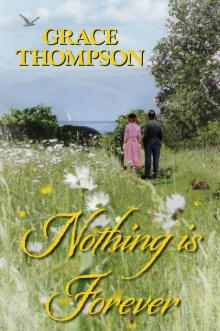 Nothing is Forever
Nothing is Forever Friends and Secrets
Friends and Secrets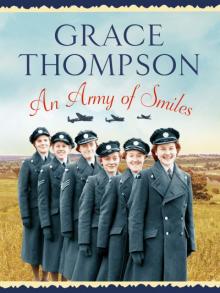 An Army of Smiles
An Army of Smiles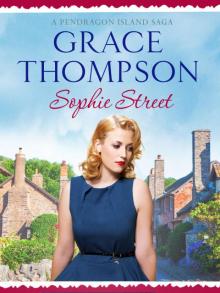 Sophie Street
Sophie Street Gull Island
Gull Island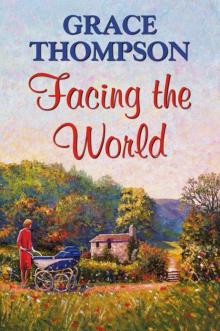 Facing the World
Facing the World The End of a Journey
The End of a Journey Unlocking the Past
Unlocking the Past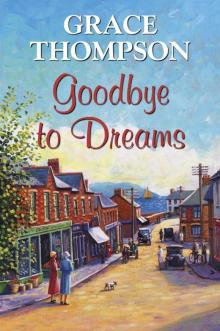 Goodbye to Dreams
Goodbye to Dreams The Weston Girls
The Weston Girls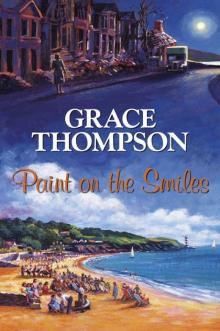 Paint on the Smiles
Paint on the Smiles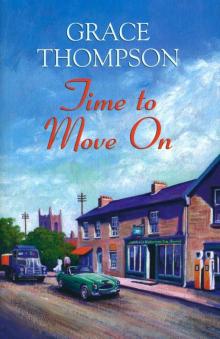 Time to Move On
Time to Move On The Runaway
The Runaway